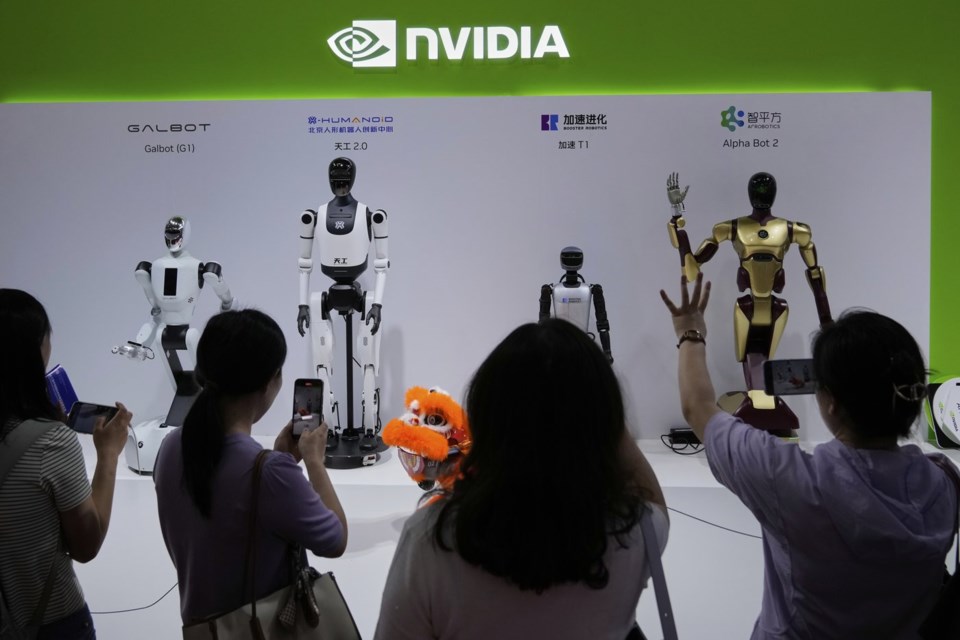SAN FRANCISCO (AP) — Artificial intelligence bellwether Nvidia is poised to release a quarterly report that's expected provide a better sense about whether the stock market has been riding on an overhyped bubble or whether it's being propelled by a technological boom that's still gathering momentum.
The financial results due out Wednesday afternoon have become a key AI barometer during the past two years because Nvidia makes most of the chips that power the technology in vast data centers scattered throughout the boom. Nvidia become the first publicly traded company to surpass a market value of $4 trillion last month, and its stock price has gained another 13% since then to create an additional $500 billion in shareholder wealth.
This summer's run-up has continued Nvidia's jaw-dropping rise from early 2023, when the company's market value was hovering around $400 billion, shortly after OpenAI's late 2022 release of its ChatGPT chatbot triggered the biggest craze in technology since Apple released the first iPhone in 2007.
While the technology industry has been the biggest beneficiary of the AI frenzy, it's also been a boon for the overall stock market. The benchmark S&P 500 has gained 68% since the end of 2022, with AI fervor fueling much of the investor optimism.
But even amid the general euphoria, there recently have been murmurs about whether AI mania will prove to be an echo of the late 1990s dot-com boom that culminated in an excruciating stock market meltdown in 2000 that eventually drove the U.S. economy and plunged Silicon Valley into a funk that lasted several years before the tech industry began to thrive again.
Investors were recently spooked by a combination of an MIT report that said 95% of AI pilots fail and comments from OpenAI CEO Sam Altman floating the idea that the artificial intelligence market is in a bubble.
And by some metrics, the stock prices of tech companies at the AI are looking frothy. For instance, Nvidia is trading at about 40 times its future earnings, roughly double the rate that investors traditionally believe is a reasonable level. Meanwhile, the market value of Microsoft, another AI leader, is hovering just below $4 trillion, while the values of other fellow pacesetters Amazon, Facebook parent Meta Platforms and Google parent Alphabet currently range from $1.9 trillion to $2.5 trillion.
Nvidia is expected to post another quarter of robust growth for the May-July period of its fiscal year. Analysts surveyed by FactSet research predict Nvidia will earn $1.01 per share, excluding certain items unrelated to its ongoing business, which would be a 49% increase from the same time last year. The analysts anticipated Nvidia's revenue would rise 53% from a year ago to about $46 billion.
Those gains reflect the financial tsunami flooding the AI market as the biggest players spend heavily to build and expand data centers needed to power the technology. Microsoft, Amazon, Alphabet and Meta are collectively budgeting more than $325 billion for investments in AI this year. With its dominant position in the AI chip market, Nvidia is reaping the benefits of that intense demand.
Even so, the trajectory of Nvidia's growth has been tapering off. If analyst projections pan out, Nvidia's revenue growth for its latest quarter will be significantly lower than the 122% increase it posted during the same period last year.
And Nvidia has also been losing business because of President Donald Trump's trade war with China. Following a ban on its AI chip sales in China, which resulted in a $4.5 billion blow to its finances during its fiscal first quarter, Nvidia estimated that the restrictions would cost it about approximately $8 billion in sales in this during the past quarter.
Trump took the China handcuffs off of Nvidia earlier this month in return for a 15% cut of the company's sales in that country — a compromise CEO Jensen Huang is expected to discuss with analysts while he shares his perspective on the state of the AI market on a call with investors.
Michael Liedtke, The Associated Press



